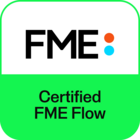I'm very new to the concept of deploying things within a Docker environment. As far as I know, FME Server works perfectly fine with this but what about the interaction with FME Server after it´s up and running. Are you as a workspace author just uploading your workspaces like you do on a normal FME Server on a regular Windows plattform? Same with FME Projects?
My second question is if there is a way to use Docker and Jenkins to install FME Projects instead of the normal way through FME Server Gui import/export.
Regards
Stefan






